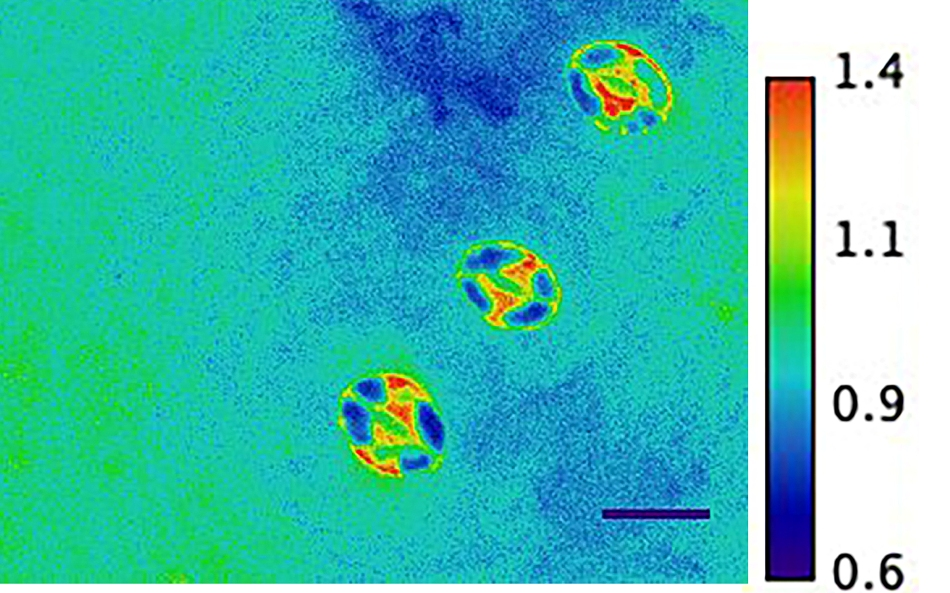Jun 2 2020
A deeper insight into fundamental processes has been sought for a long time by plant biologists. Such processes involve kinases, which are enzymes that catalyze the primary biological activities of proteins.
 The image depicts three Arabidopsis leaf surface pores, or stomata, expressing the new SNACS stress nanosensor developed by UC San Diego plant biologists. Image Credit: University of California San Diego.
The image depicts three Arabidopsis leaf surface pores, or stomata, expressing the new SNACS stress nanosensor developed by UC San Diego plant biologists. Image Credit: University of California San Diego.
In today’s environment, which is highly modified by climate warming, it is critical to examine the processes behind kinases in plants.
Some “SnRK2” kinases (sucrose-non-fermenting-1-related protein kinase-2s) are vital as they get activated when drought conditions occur, thereby initiating the protective closure of small pores on the surfaces of leaf called stoma.
Although such pores enable carbon dioxide to penetrate through leaves, plants also lose over 90% of their water by evaporation through the stoma. The opening and closing functions of the pore help maximize the growth and drought resistance in reaction to variations in the environment.
Currently, at the University of California San Diego, plant biologists have designed a new nanosensor that enables scientists to track SnRK2 protein kinase activity in live plant cells. The researchers have described the SnRK2 activity sensor, or “SNACS,” in the eLife journal.
Earlier measures that were taken to dissect protein kinase activities included a laborious process of crushing plant tissues and quantifying the kinase activities via cell extracts. Over 100 leaves were needed for each experiment to analyze the development of stomatal pore into “guard cells.” At present, the SNACS enables scientists to examine variations in real-time as they occur.
Previously, it was not possible to investigate time-resolved SnRK2 activity in living plant cells. The SNACS sensor reports direct real-time visualization of SnRK2 kinase activity in single live plant cells or tissues.
Julian Schroeder, Study Senior Author and Distinguished Professor of Biological Sciences, University of California San Diego
Schroeder is also a member of the Section of Cell and Developmental Biology.
The latest biosensor has already yielded good results. The scientists explain the use of SNACS to offer new evidence regarding the long-term questions about SnRK2 and fundamental interactions with carbon dioxide.
They demonstrated that kinases are activated by a drought stress hormone in plants called abscisic acid, but that carbon dioxide does not activate kinases. This resolves a recently debated question.
Our findings could benefit researchers investigating environmental stress responses in plants and analyzing how different signaling pathways interact with one another in plant cells. The ability to investigate time-resolved SnRK2 kinase regulation in live plants is of particular importance for understanding environmental stress responses of plant cells.
Yohei Takahashi, Study Co-Corresponding Author and Project Scientist, University of California San Diego
The latest nanosensor was designed by a method pioneered by the late UC San Diego Professor Roger Tsien, for which he was awarded a Nobel Prize in part.
The research group included Li Zhang, Yohei Takahashi, Po-Kai Hsu, Kollist Hannes, Ebe Merilo, Patrick Krysan, and Julian Schroeder.
The study was financially supported by the National Institutes of Health (GM060396), the National Science Foundation (MCB-1900567 and MCB-1137950), a China Scholarship Council fellowship, and a Postdoctoral Fellowship for Research Abroad from the Japan Society for the Promotion of Science.
Journal Reference:
Zhang, L., et al. (2020) FRET kinase sensor development reveals SnRK2/OST1 activation by ABA but not by MeJA and high CO2 during stomatal closure. eLife. doi.org/10.7554/eLife.56096.